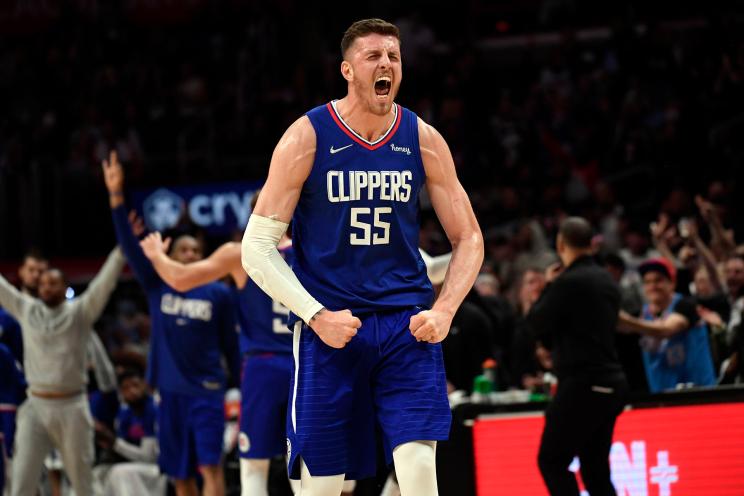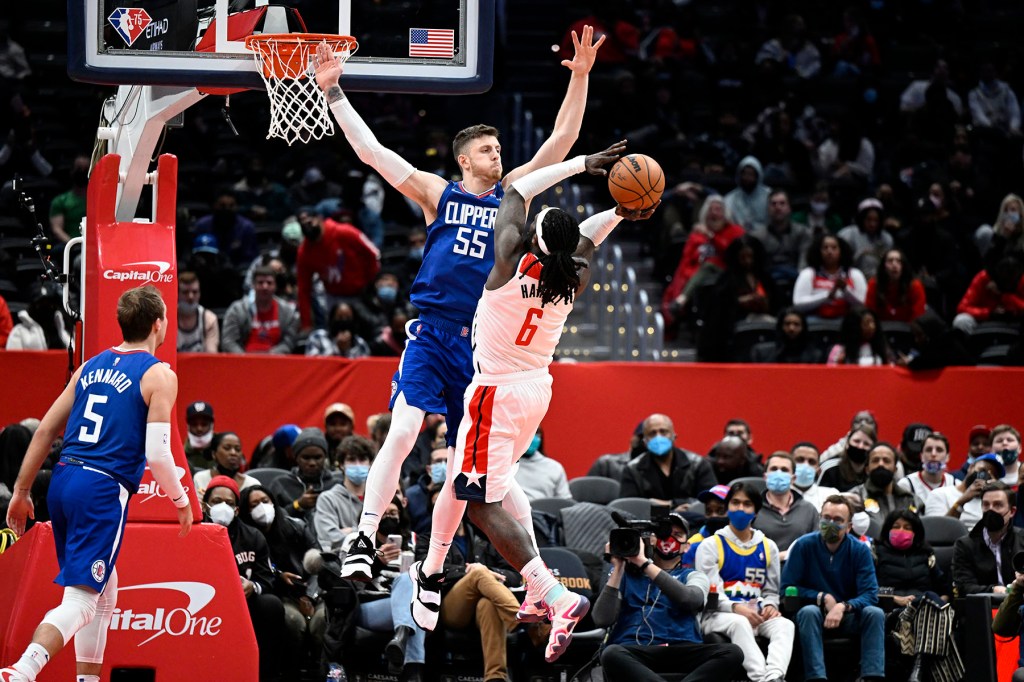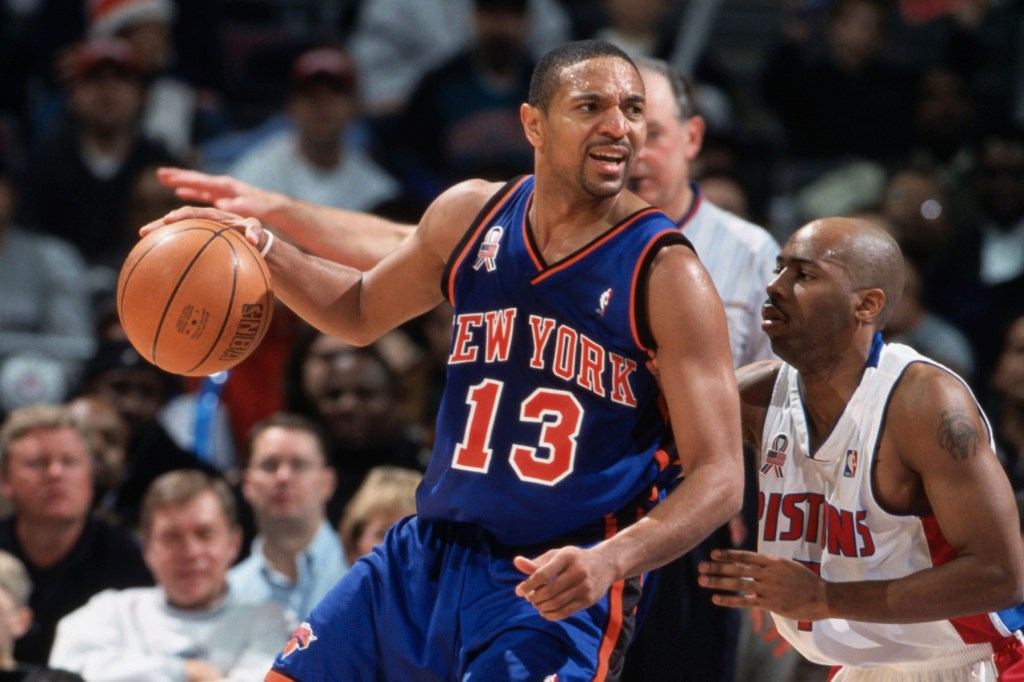Isaiah Hartenstein has been playing professional basketball since the age of 16. Eschewing college, Hartenstein bounced around with four different franchises — and for parts of three seasons in the G League — before landing in New York this summer with what appears to be the first settled role of his career.
That long, winding journey is all part of the 7-foot Hartenstein’s story, each stop a key factor leading to the breakthrough two-year, $16 million contract with the Knicks.
“He earned it,” his father, Flo, told The Post in a phone interview. “I’m just very proud of him. I’ve seen what he’s gone through.”
Patience was required. So were good fortune and an ability to take advantage of it, as he did this past season with the Clippers.
Hartenstein beat out former top-20 draft pick Harry Giles III for a roster spot in training camp. He then became the team’s backup center by outplaying Serge Ibaka, who was eventually traded. The 24-year-old center went on to average 8.3 points, 4.9 rebounds and 2.4 assists with the Clippers last season while shooting 46.7 percent from 3-point range in 17.9 minutes per game. Just as important, he logged a career-high 68 games.
His breakout as a rotation mainstay came on the heels of a meandering start to his NBA career. A second-round pick of the Rockets in 2017, Hartenstein spent much of his first three seasons in the G League, winning that league’s Finals MVP award in 2019. In 2020, he was waived by the Rockets, and had brief stints the following season with the Nuggets and Cavaliers. In all, he appeared in just 97 NBA games before last season.
“It’s been not the easiest couple of years for him, going to the draft and [not getting] drafted where we thought he would be,” said Flo, who played college basketball at Oregon and professionally in Germany before later coaching there. “And then with the Rockets going to a small-ball situation where they took every minute away. It’s been a lot of ups and downs he had to fight through. He had to stay positive the whole time.
“It’s always been like fighting to pull yourself up and being pushed back down again. … It always got very frustrating. But he has a very good mindset where he believes that he can be a good player in the NBA, and … he also has a good support system of family and friends around him that encourage him to stay positive.”
Hartenstein’s versatility, his ability to protect the rim while also being able to shoot a little from beyond the arc (46.7 percent on 30 attempts last season) and his passing (2.4 assists per game in 2021-22) are what endeared him to the Clippers and appealed to the Knicks in free agency. Flo had his son work on all areas of his game as a kid growing up in Germany. He would play every position, and because Hartenstein was more developed than others his age, his father wouldn’t allow him to shoot in certain parts of the game when the score was lopsided.
“It’s one of the reasons his basketball IQ is so good,” said Flo, who has since stopped coaching and returned to the States to be close to his son. “He knows how to play almost every position.”
When Flo retired from playing for the Artland Dragons in Germany, he launched their youth program, and coached his son there for several years. As Hartenstein got better, he eventually began to practice with Artland’s pro team, eventually suiting up for them in 2015. Some thought was given to him going to college in America — Oregon was interested — but the family figured he would be better served by not playing in the American college system.
“At that time, we didn’t want him to be just a pure five,” Flo said. “And in college, if you’re 7-feet tall, it’s automatic you get put at the five-man spot. We thought it would be better development for him to do it in Europe.”
Clearly, it was the right decision, despite the draft disappointment and his battle to find his niche in the league. It may have taken Isaiah Hartenstein a few years, but patience has paid off for the new Knick.
RJ Barrett’s extension and the rising salary cap
There were already plenty of reasons for the Knicks to lock up RJ Barrett to an extension, but let’s add this onto the pile: With the salary cap expected to increase significantly in the next several years, as The Athletic’s John Hollinger reported, a max extension for Barrett may become a bargain.
Right now, he can land a five-year deal worth $180 million. That’s $36 million per season. The salary cap for 2022-23 was set at $123.655 million, up from $112.414 million last year. But the belief is that it could rise to the neighborhood of $200 million in the not-so-distant future, which would decrease the impact a max extension for Barrett would have on the Knicks’ cap situation. That could be especially important when it comes to being able to build around a 22-year-old player who has gotten better each season.
Also, by giving Barrett the max now, it makes another contract extension down the road more feasible, since the maximum raise on an extension is 120 percent of the player’s final-year salary, unless he becomes supermax eligible by being named to one of the NBA’s three all-league teams or winning the Defensive Player of the Year award. If the Knicks don’t have a high enough baseline from which to offer a raise and the NBA salary cap has gone through the roof, Barrett could be able to make more on the open market and have reasons to test free agency .
The bottom line is the Knicks would be smart to keep Barrett happy, and with other players drafted around him in 2019 receiving rookie max contracts, the Knicks should lock him up. The pending significant rise of the salary cap makes it a no-brainer.
Mark Jackson gets nostalgic
Mark Jackson was in a nostalgic mood Tuesday night at the premiere of “NYC Point Gods,” the Kevin Durant-backed documentary about New York City lead guards from the 1980s and 1990s that included the Brooklyn native. He recalled his days as a player, from Bishop Loughlin to St. John’s to the Knicks, and what might’ve been had he never been traded to the Clippers following the 1991-92 season for Charles Smith and Doc Rivers.
“Well, I do believe that we win a championship,” said Jackson, the ESPN analyst and 1987 NBA Rookie of the Year. “We had a great team, we had a process moving along, we advanced. We had the ultimate champs on the ropes. So I believe we win a championship if that team stays together. But I’m sure if you ask the opposition, they believe they win anyway.
“We were up in the fourth quarter of a Game 7 [of the Eastern Conference semis against the Bulls], with Michael Jordan on the team. So I’m not saying something that’s asinine. They were an all-time great team, and they had an all-time great player. But I believe we had a chance to beat him, and I think that if we stayed together we would have.”
Jackson never won a title in an 18-year NBA career in which he averaged 9.6 points and 8.0 assists. He did reach the Finals once, in 2000 with the Pacers, the year after Jordan retired from the NBA for a second time.








